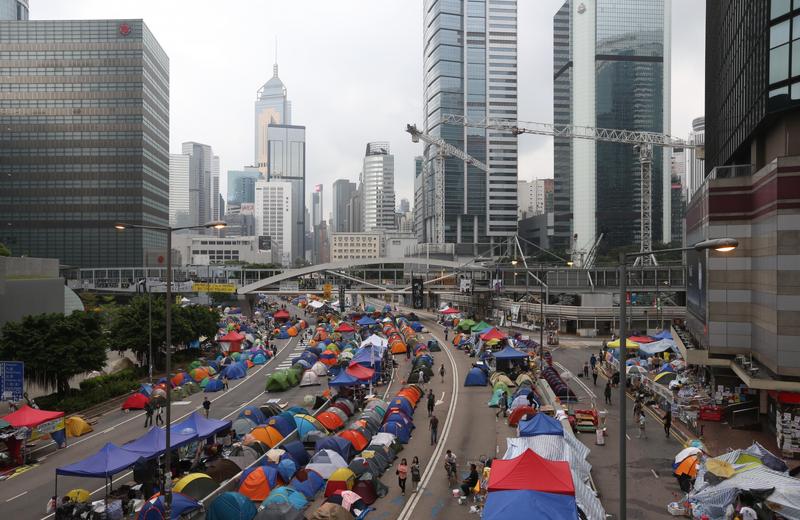Don't make a travesty of Nobel Peace Prize by honoring violent protest leaders

Two leading figures in the US’ ruling Republican Party, Senator Marco Rubio and Representative Chris Smith, the respective chair and co-chair of the US Congressional-Executive Commission on China, have announced that they proposed to support the leadership of the 2014 "Umbrella Movement" in Hong Kong, specifically naming movement "leaders" Joshua Wong, Nathan Law, and Alex Chow, for this year’s Nobel Peace Prize. The Executive Commission is an independent agency with a mandate from Congress to monitor human rights in China.

Now, there is nothing wrong with nominating people from another part of the world for a prize intended to reward global efforts for peace. the late South African President Nelson Mandela was a fine example, having attracted worldwide admiration for his role in bringing about a peaceful transition to non-racial democracy in his country. But the leaders of the Occupy movement in Hong Kong in 2014 were no Nelson Mandela. They risked very little – only short prison sentences and even those were widely disputed – and their actions were clearly counter-productive. Hong Kong could have had a chief executive elected by universal suffrage now if it hadn’t been for the 2014 turmoil. How has this contributed to peace?
It’s not that we don’t know what is motivating this. No, I’m not saying that America is always anti-China any more than that China is always anti-America. But it is always possible to gain a bit of extra support in the US by taking positions which will be interpreted by the electors as "standing up to China". This is not the position of President Donald Trump (although on occasion he can appear to take such stances too) or of anyone else in positions of responsibility in the US. It is part of the American electoral cycle; every now and then it seems advantageous, for electoral purposes, to take up positions reminiscent of the Cold War, only to resile to a more constructive position once practical cooperation becomes necessary.
Neither Senator Rubio nor Representative Smith are known for the intensity of their engagement with China, otherwise they would have known where it makes sense to make a stand and where it does not. But I suspect they have no interest whatever in what reactions in the HKSAR or the mainland will be. They are only interested in impressing other Americans who have no knowledge of or interest in China. American society is notoriously somewhat insular: it is a common, but short-sighted view among US politicians that all they need to do is bang the patriotic drum rather than sit down and genuinely engage with the rest of the world.
The Nobel Prize should be more important than that. It should not be a stick for one country to beat the other over the head with. That is hardly going to be conducive to world peace. Ideally, it should honor figures who, like Mandela, have earned international recognition for what they have achieved, or at least tried to achieve, for international peace and understanding.
With growing maturity, it can be hoped that the "Umbrella Movement" protestors of 2014 will learn from their experiences and come to use their undoubted intelligence to make a more constructive and effective contribution to the HKSAR and to the Chinese mainland under "one country, two systems". But no good result will ensue from proposing globally recognized honors for them on the basis of what they have done so far, which include inciting violence and causing injuries for which they have been given decidedly lenient jail sentences.
No harm is done by focussing the attention of the world on the HKSAR. In the context of current global economic relations, and especially in the context of the historic Belt and Road Initiative, most publicity for the territory is good publicity. But not this. Hong Kong, utterly committed to steering a very difficult course through uncharted waters (the "one country, two systems" has never been tried before), has managed to negotiate the difficulties presented by the "Occupy" protests of 2014, while both maintaining peace on the streets and not demonstrating excessive severity in enforcing the law; no one with the slightest acquaintance with the HKSAR could deny it remains a stable, though vibrant, society.
The successful maintenance of this balance, while also sustaining the vital role of the HKSAR’s independent judiciary, is what the territory should be judged by. Any discussion of an international celebration of a few young activists, who were judged according to law and given fairly light punishments, would cast Hong Kong in the role of a despotic tyranny, which it is not and never has been, before or after 1997.
My friends in America, please resume some common sense, and don’t make yourselves look ridiculous. Hong Kong will continue as a region subject to the rule of law, and causing disruption to such an entity can never be described as a contribution to world peace.
The author is a Sinologist, lecturer, writer, columnist and former British diplomat in Beijing.
- Rural China tackles hefty bride prices to ease marriage burdens
- Market fire causes multiple casualties in North China's Hebei
- 'Ferryman of souls' escorts cremains of veterans from Taiwan to mainland home
- China announces month-long online shopping event for Spring Festival
- Hong Kong-Zhuhai-Macao Bridge reports record high passenger flows in 2024
- China launches action plan to tackle dementia amid aging population challenge





































